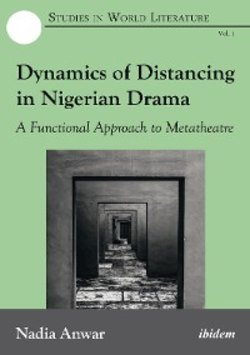Читать книгу Dynamics of Distancing in Nigerian Drama - Nadia Anwar - Страница 6
Chapter 1
Distancing through Metatheatre
ОглавлениеThe culturally rich theatrical traditions of Nigeria have produced a number of outstanding dramatists who have enriched the field of dramatic literature. Their plays are an excellent example of how imaginative material from the past can be adapted according to the performance aesthetics and social and political realities of specific sites informed by the geo-cultural setting of the African continent. Because of this significant aesthetico-political connection, Nigerian drama has previously been studied under the politically motivated distancing model presented by Bertolt Brecht;[1] but there has hitherto been no attempt to go beyond these obvious yet rigid associations between politically motivated Brechtian dramatic practices and aesthetically appealing Nigerian performance traditions and to create a synthesis between two extremes of dramatic reception—one which rests on cognition and an other which involves emotions. In this study, the crucial theoretical strand is provided by Thomas J. Scheff’s seminal work on the role and levels of emotional reception in dramatic situations which, although they involve the detachment necessitated by Brechtian principles, also embrace the cathartic pleasure derived from emotional attachment to a performance.
Scheff’s theory focuses on the creation of such scenes/situations in drama which need to first “touch upon the repressed emotions that are shared by most members of the audience”, at the same time allowing them sufficient freedom not to be overwhelmed by these (Scheff 2001, 155). Similarly, Brecht’s distancing, according to Eriksson, is “realized by detachment from uncritical empathy, not from emotion” as generally assumed (2009, 48). The current study demonstrates how critical empathy can be aimed for and achieved through the employment of illusion-breaking or metatheatrical techniques which produce and modulate the degrees of dramatic distancing in the plays selected for analysis. Although apparently opposed to Scheff’s cathartic model, Brecht’s theory is both the foundation and driving force behind it in terms of interdependence of distancing and illusion, and their varying levels. The degree of illusion depends on how much a playwright desires his or her audience to detach from or attach themselves to the performance. In both Brecht’s and Scheff’s works, the creation of a dramatic illusion is oriented towards the achievement of degrees of transformation in actor-audience’s perception about reality and potential capacity to reflect and act upon that reality. Whereas for Brecht the experience of emotional catharsis leads to complacency in the audience, Scheff considers the same as a means to regain emotional equilibrium. The interesting combination of these interdisciplinary models of distancing and then of reading them through the lens of metatheatrical illusion address both the playwright’s call for intellectual activity and the emphasis on emotional attachment. In the context of Nigerian drama, the combined model derived from the distancing practices of Brecht and Scheff is very relevant as it foregrounds the socio-political and cognitive dimensions of texts and their impact on audiences (through the Brechtian model) and the emotional and aesthetic aspects (through the Scheffian balancing model).
The current chapter consists of three sections. In Section A, the critical framework of this study, derived from Bertolt Brecht’s groundbreaking experimentation in theatrical arts and Thomas J. Scheff’s psychological excavations into the social dynamics of the concept of distancing, is discussed. Section B interrogates the conceptual relation between dramatic distancing and metatheatre and provides evidence of how the latter seeks to estrange, alienate, or distance audiences. Section C gives an overview of existing critical perspectives on post-independence Nigerian drama. It investigates current critical analyses and readings of Nigerian drama that either seek to promote cognitive or emotional aspects of audience reception or to overlook the manifestation of different dramatic forms which can strike a possible balance in terms of emotions.
